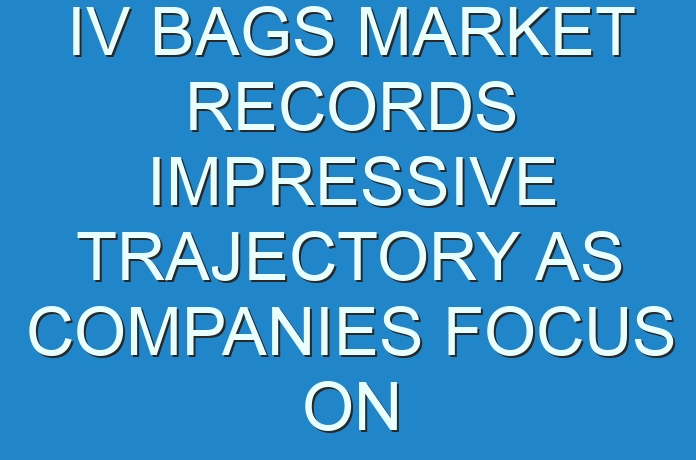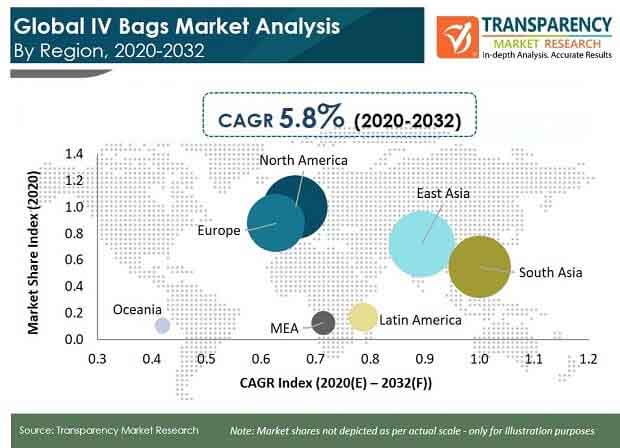
In its recent study, Transparency Market Research (TMR) offers insights into the global IV bags market. According to the study, the market is forecast to rise at 5.8% between 2024 and 2032. The increasing adoption of injection-based therapies in various treatment modalities has been fuelling the demand for IV bags. According to TMR, among applications, injection-based therapies are likely to create incremental opportunity of more than 1.5 Bn between 2024 and 2032. IV bags sales will surge further, spurred by the demand from parenteral nutrition players and intravenous therapy providers.
Among various types of bags available, single chamber IV bags more preferred. To identify hidden opportunities, TMR segments the market in terms of material type, capacity, chamber type, and application across five key regions. According to the report, polypropylene material for IV bags is expected to hold the dominant share in the market since these bags are available at a low cost and they offer better puncture resistance and durability.
Want to know the obstructions to your company’s growth in future? Request a brochure @ https://www.transparencymarketresearch.com/sample/sample.php?flag=S&rep_id=23147
Material Innovations Hold Key to Success
Ardebil’s Arta Serum Company partnered with Barekat Foundation to manufacture a new generation of IV fluid bags, which can better prevent absorption or discharge of serum through the walls of the bags. Traditional bags were known to absorb almost 30% of the medication in the solution. It incurs huge loss in case of cancer medication, which is both costly and rare. Producers claim that the new generation IV bags can overcome all deficiencies of existing plastic packs. Therefore, innovation, in terms of materials used, are expected to offer lucrative opportunities for growth of the market.

Convenience at the Core of Innovation
Some of the leading manufacturers across the world are focusing on product innovation, with their key objective being ensuring improved convenience. Fresenius Kabi’s new non-PVC intravenous fluid and drug combination delivery system exemplifies the same. Known as FreeFlex, these delivery systems are designed to improve consumer experience and offer extended pH interval and drug compatibility.
More importantly, these bags are environment-friendly and have easy-to-peel overwrap. They are available in sizes ranging from 50 ml, up to 1000 ml and more importantly they are free from any synthetic additive, glue, and PVC. Along with these attributes, these new generation bags are tamper-proof and offer better protection against airborne contamination.
The market is expected to witness similar innovations especially since several other manufacturers are aiming at improving features of their IV bags to gain competitive advantage in the market.
Incompatibility of IV Bags with Certain Biological Compounds
Risk of potential incompatibility between the solutions with the container poses threat to the market players. Often, solutions contained inside an IV bag can react to materials used for making the bag, causing imbalance or disruption in the pH value of the solution. Such incompatibilities can cause either physical or chemical reaction, with the latter being more harmful, as it increases the chances of producing toxic by-products.
For instance, as per an independent study, diazepam injection into plastic IV bags resulted in the loss of potency of the solution by more than 24%. Therefore, it was recommended that glass containers should be used to administer diazepam. Once established, such results are anticipated to hamper the growth of the global IV bags market.
Purchase Premium Research Report @ https://www.transparencymarketresearch.com/checkout.php?rep_id=23147<ype=S
IV Bags: Competitive Landscape
The presence of established companies as well as several smaller and local players has rendered the global IV bags market highly fragmented. TMR finds that larger percentage of the overall market share is currently held by local and domestic companies. To study the nature of competition prevailing in the market, TMR has profiled companies such as B. Braun Melsungen AG, Baxter International Inc., Pfizer Inc, Wipak Group, Technoflex S.A, Fresenius SE & Co KGaA, Sippex, Polycine GmbH, Kraton Corporation, The Metrix Company, Medicopack A/S, Macopharma SA, Haemotronic S.p.A., Renolit Solmed, Otsuka Pharmaceutical India Private Limited, Alfa Laboratories, Qosina Corporation, ICU Medical, Inc., JW Life Science and Angiplast Pvt. Ltd.
It has further classified the company in different tiers to study their competitive strengths. For instance, companies such as B. Braun Melsungen AG, Baxter International Inc., Kraton Corporation and Fresenius SE & Co KGaA are identified as Tier 1 players. These companies primarily focus on the expansion of their production capacity. In order to strengthen their footprint, they also are likely to acquire local players. Likewise, some of the companies included in Tier 2 are RENOLIT Group, Terumo Corporation, and ICU Medical, Inc.
Read Our Trending Press Release Below: https://www.prnewswire.com/news-releases/rising-awareness-about-cleanliness-and-hygiene-across-public-places-to-sow-the-seeds-of-growth-across-the-forecast-period-of-2020-2030-tmr-301248244.html





